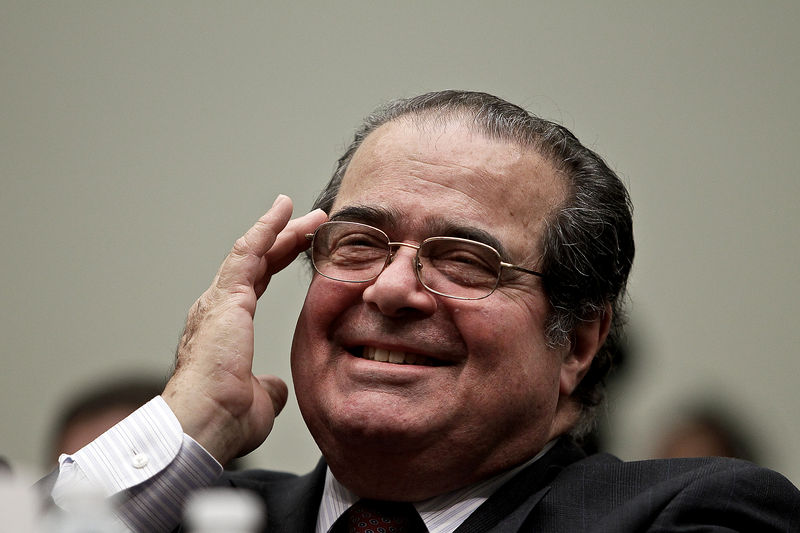
News of Justice Antonin Scalia’s unexpected death shocked the nation over the weekend and the conservative jurist has received praise from everyone from the GOP Presidential field to liberal colleague Ruth Bader Ginsberg. With the sharp-tongued judge’s reputation cemented in history, his real legacy – the legal doctrine he helped establish – is now in danger.
At this very moment, President Obama is planning to name Scalia’s successor who no doubt will be more liberal and more activist than the man who sat in that seat for thirty years. 2016 has become more than just a referendum on the executive branch; it is now a referendum on the federal judiciary.
Before Scalia’s passing, the nation’s highest court had almost perfect ideological balance between the competing camps of American politics. The Supreme Court had a moderate, Anthony Kennedy, who was flanked to the left and right by four justices. But now, the conservative wing is down to only three.
With numerous crucial issues coming before the court this term, the best the conservative wing can hope for is a draw. Even if Thomas, Alito, and Roberts (who has been suspect himself, twice upholding the Affordable Care Act) sway Kennedy, they still can only manage a 4-4 decision. If that were to happen, the decision of the lower court would stand. The decision would be binding on the immediate parties but would not set a national precedent, as a normal Supreme Court decision would. It would be as if the court never ruled at all.
In particular, Alabama has a vested interest in the upcoming challenge of the Obama Administration’s so-called Clean Power rule. The plan, which would be implemented by the Environmental Protection Agency (EPA), would mandate a 750 million metric ton reduction in CO2 emissions through increased regulations on existing power plants, especially coal-fired plants.
The President’s “War on Coal” has already hit home in Alabama, where environmental mandates forced Alabama Power to close two of the state’s coal-fired units and transition two others from coal to natural gas. Additionally, a study found that President Obama’s Clean Power Plan could raise Alabamians’ power rates by a jaw-dropping 20 percent.
Thanks to Scalia’s vote, the court granted a request by roughly two dozen states, including Alabama, to put the Obama administration’s power plant-targeting carbon rules on hold. The move was significant, albeit not final blow to the administration’s global warming agenda.
The D.C. Circuit Court of Appeals hears oral arguments on the rule starting June 2. Of the three judges on the D.C. panel, one is a Clinton appointee, another is a recent Obama appointee, and the third is an H.W. Bush appointee with environmentalist sympathies. Long story short, it does not look good for those who hope for lower rates and freer markets.
If the D.C. Circuit upholds the rule-which it likely will-and the Supreme Court reaches an en passe- which it could-the President’s regulatory overreach will stand as law.
The best hope that the Yellowhammer State has now is the U.S. Senate. According to the Constitution, the Senate holds the power to give “advice and consent” to all nominations for the Supreme Court. On a liberal list that’s rumored to include the controversial Loretta Lynch, Senate Republicans have every Constitutional Right to block as President Obama does to appoint.
While it is true that precedent exists for an election year appointment to be nominated and confirmed, the left leaves out an import piece of context from the historical record. Since 1900, there have been six vacancies on the Supreme Court during an election cycle. That much is true. However, all but one of those confirmations came during a period of united government, meaning that the same party controlled Congress AND the White House.
The instance that occurred when government was divided happened to be infamous Robert Bork debacle, where a Democratic Senate denied President Reagan the right current Democrats claim that President Obama has: the right to appoint, and have approve, his first choice to the court.
President Obama speaks of a mandate, but the current governmental landscape says otherwise. Both houses of Congress are controlled by Republicans and the people voted in 2014 to maintain divided federal branches.
Alabama has a chance to “defend our rights” in the future, but federal intrusions like the EPA’s Clean Power Plan and Waters of the United States Rule can only be stopped by courts that know how to properly address regulatory agencies overstepping their authority.
His entire career, Scalia desired for issues to be played out by the democratic process rather than be determined by authorities with a weak mandate. What greater way to disgrace his legacy than to replace him when no clear mandate from the people exists. Frankly, anyone who says otherwise is spouting pure jiggery-pokery.
Don’t miss out! Subscribe today to have Alabama’s leading headlines delivered to your inbox.